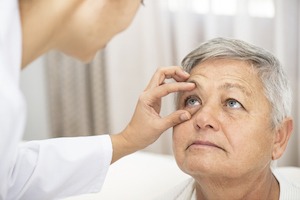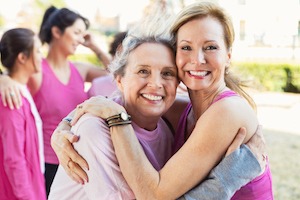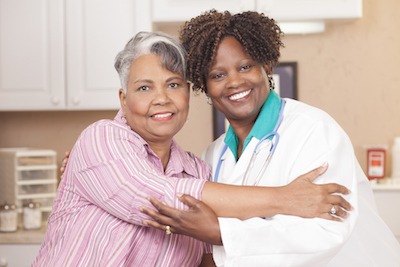Many people that have been diagnosed with a major illness, particularly cancer, share a very similar experience when they learn they have the disease: an immediate moment of disbelief, followed by a series of emotional responses unique to each individual, and ultimately the feeling of a heavy weight being left behind that feels impossible to shake. Even though it might feel hopeless in the beginning, it does get better, and there are many things that seniors diagnosed with cancer can do to help them feel supported throughout the process, and to continue living life independently and on their own terms.
Join a Cancer Community
There is scientific proof that having a positive outlook and sense of belonging to a community have positive effects on recovery for seniors diagnosed with cancer. It is important that an individual suffering from cancer knows that they aren’t alone; there are others sharing in their victories and their fight, and there is hope to be gained from seeing other with cancer thrive. While family members and friends have the absolute best intentions in their hearts, and their support is always welcomed, it’s also very important for seniors to build bonds with others in their cancer community that they have shared experiences with.
The Cancer Support Community is an excellent resource when looking for a group to share in your journey with. They have a full A-Z list of every single cancer community in the United States; no one should ever feel like they have to face down cancer alone.
Focus on Dietary Health
Dietary health can play a big role in either helping or hindering a cancer prognosis. There are foods that are known carcinogens (cancer causing), which should be avoided at all costs, and other foods that could be contributing to growth of cancer in the body. It is best for any senior diagnosed with cancer to attempt to follow a completely clean diet free of carcinogens or other risk-factor foods. It is best to remove ALL risk-factors from your diet, however, any improvement to cleaning up your diet can have incredible results on your overall health, and in this particular case, it could even help you beat cancer. Here are some general tips for an “Anti-Cancer Diet:”
- Cut out Sugars – Heavily refined sugars, flours, and dairy products can all strengthen and feed cancer cells. Attempt to remove all dairy from your diet, as well as processed flours such as white bread and pasta. Try using unsweetened nut milks instead of dairy, and sprouted grain breads and quinoa pastas in place of processed flour products. If you have a sweet tooth, try sticking to naturally occurring sugars such as fruits, honey, pure maple syrup, or natural cane sugar.
- Avoid Carcinogens – Carcinogens are foods, or substances, that have been found to actively contribute to, and even cause, the growth of cancer in the body. Processed foods (think pre-packaged deli meats, processed cheeses, fast food, chips and other junk foods), and consumption of red meats are listed as carcinogens, and should be avoided. Stick with real, raw, whole foods - grains, nuts, fruits and vegetables - and cook your own food every chance you get.
- Chemical Heavy Diets – This point is more controversial than the others, since research seems to change consistently as time goes on. But it is generally agreed upon that anyone, especially those diagnosed with cancer, should avoid excessive caffeine, alcohol, nicotine/tobacco, and any other “binge” chemicals.
In general, when you are trying to eat a diet that is going to help your body combat cancer, think raw, fresh, and clean. Eat as many raw fruits and vegetables as possible, and try shopping at a local farmers market for the freshest fruits and veggies that are local and in season.
Clean Up Your Personal Hygiene Routine
Did you know that many personal hygiene products such as toothpaste, shampoo and conditioner, lotions, makeup, sunscreens, and fragrances contain ingredients that are known carcinogens? That means that things that you are putting on or in your body on a daily basis could be causing or contributing to the growth of cancer cells in your body, among having many other negative effects in your body - scary. While it might not be realistic to remove every potentially dangerous or carcinogenic source in your life, it certainly helps to remove every one that you have control over. So take some time to look through your personal hygiene products and be on the lookout for these ingredients that are potentially carcinogenic and dangerous for your health, especially if you have already been diagnosed with cancer:
- Parabens: A group of preservatives with strong links to hormone and endocrine disruption.
- Fragrance/Parfum: A blanket term that is considered “trade secret” by the FDA and unregulated. Can contain up to 25 (average of 14) unlabeled chemicals, such as phthalates and formaldehyde releasers.
- Talc: An opacifying and texturizing powder with allergenic and hormone disruption links. Can be contaminated with asbestos.
- Oxybenzone/Avobenzone/Octinoxate: Synthetic sunscreens that transform radiation rather than deflecting it like their physical counterparts Zinc Oxide and Titanium Dioxide. Linked to hormone and endocrine disruption.
- Sodium Lauryl Sulfate + Sodium Laureth Sulfate: Surfactant cleansers that are strongly linked to skin reactions and allergies as well as organ system toxicity.
- Triclosan: An antibacterial often found in toothpaste and personal care goods with linked to contamination, bio-accumulation and irritation. Banned by the FDA from certain items but allowed in others still.
- Bismuth Oxychloride: A mineral found often in mineral makeup for a pearlescent sheen. Frequently causes irritation such as rashes and redness.
- Mineral Oil/Paraffin/Petroleum: Derived directly from Petroleum, these ingredients are strongly linked to toxicity due to contamination. Mineral oil is also known to clog pores.
- PEGs: A group of compounds called polyethylene glycols derived from petroleum and often carcinogenic. These ingredients may read something like “PEG-40 XYZ” or as simple as polyethylene glycol.
If it seems overwhelming to start cleaning up your routine, take it one step at a time. Find some green and clean brands that you like, and stick with them!
Create A Dreams List and Pursue it!
In an effort to promote a more positive approach to making our dreams into reality, we propose that we drop the "b-list" term, and come up with another term. Something like… "Dreams List." Come up with a list of goals, experiences, and dreams you’d like to complete in your lifetime, and start pursing that list! Much like joining a supportive community, completing aspects of your list brings a big positive feeling of accomplishment and happiness, which can actively help your body and mind to cope with cancer.
Beyond the measurable effects on the healing process, it is also important for seniors suffering from cancer to not focus so intently on treatments and cures that they forget themselves and what makes them happy. Maintaining your mental health and happiness is extremely important to maintaining your physical well-being. So reward yourself with some happiness and joy by fulfilling aspects of your dream list and living to the fullest! Ask your family members for help in completing items on your list, or if you have an in-home caregiver, they can also help you!
Utilize Cancer Resources
There are a number of incredible cancer resources for those seeking a range of different treatments. Whether you decide to pursue traditional cancer treatment, or go the route of a more naturopathic cancer treatment; you have options. There is a website and community for just about any type of cancer, along with hundreds of funding options, and countless different treatment methodologies.
If you are pursuing traditional care, the National Cancer Institute is the gold standard. There are pages and pages of informative posts on every type of cancer, funding options, and also Doctor Resource Centers to connect you with the best possible physician, and active communities to help support you.
CancerTutor.com is a rapidly growing cancer website that is focused on natural care. There are hundreds of options to consider if you decide to pursue natural care, some of them considerably more reputable than others. CancerTutor checks out and rates natural clinics and methodologies within an entirely non-profit model, allowing you to choose a doctor confidently. CancerTutor also has a range of community resources, diets, videos, and an incredible message of empowerment.
Never Stop Fighting
No matter which route you decide to take, whether it be natural or traditional, if you decide to join a cancer community, or rely on the support of your friends and family exclusively, whether you change your diet up or not... The most important thing to always keep in your mind is to never stop fighting. Every day, hundreds of Americans beat cancer, and we genuinely believe that you can too.
If you have been diagnosed with cancer and need some help to remain at home and continue to live life to the fullest, we can help. We refer qualified and compassionate care providers that can help perform a variety of services such as assistance with medications, meal preparation, and accompaniment to doctor's visits, among many others. Contact your Client Care Liaison today to discuss your options, they are standing by and ready to help!








